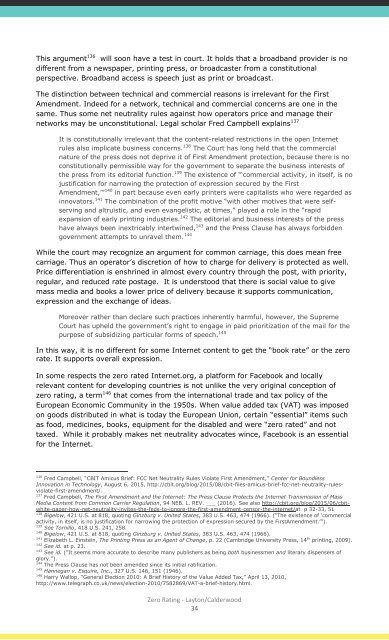Layton
Layton
Layton
You also want an ePaper? Increase the reach of your titles
YUMPU automatically turns print PDFs into web optimized ePapers that Google loves.
This argument 136 will soon have a test in court. It holds that a broadband provider is no<br />
different from a newspaper, printing press, or broadcaster from a constitutional<br />
perspective. Broadband access is speech just as print or broadcast.<br />
The distinction between technical and commercial reasons is irrelevant for the First<br />
Amendment. Indeed for a network, technical and commercial concerns are one in the<br />
same. Thus some net neutrality rules against how operators price and manage their<br />
networks may be unconstitutional. Legal scholar Fred Campbell explains 137<br />
It is constitutionally irrelevant that the content-related restrictions in the open Internet<br />
rules also implicate business concerns. 138 The Court has long held that the commercial<br />
nature of the press does not deprive it of First Amendment protection, because there is no<br />
constitutionally permissible way for the government to separate the business interests of<br />
the press from its editorial function. 139 The existence of “‘commercial activity, in itself, is no<br />
justification for narrowing the protection of expression secured by the First<br />
Amendment,’” 140 in part because even early printers were capitalists who were regarded as<br />
innovators. 141 The combination of the profit motive “with other motives that were selfserving<br />
and altruistic, and even evangelistic, at times,” played a role in the “rapid<br />
expansion of early printing industries. 142 The editorial and business interests of the press<br />
have always been inextricably intertwined, 143 and the Press Clause has always forbidden<br />
government attempts to unravel them. 144<br />
While the court may recognize an argument for common carriage, this does mean free<br />
carriage. Thus an operator’s discretion of how to charge for delivery is protected as well.<br />
Price differentiation is enshrined in almost every country through the post, with priority,<br />
regular, and reduced rate postage. It is understood that there is social value to give<br />
mass media and books a lower price of delivery because it supports communication,<br />
expression and the exchange of ideas.<br />
Moreover rather than declare such practices inherently harmful, however, the Supreme<br />
Court has upheld the government’s right to engage in paid prioritization of the mail for the<br />
purpose of subsidizing particular forms of speech. 145<br />
In this way, it is no different for some Internet content to get the “book rate” or the zero<br />
rate. It supports overall expression.<br />
In some respects the zero rated Internet.org, a platform for Facebook and locally<br />
relevant content for developing countries is not unlike the very original conception of<br />
zero rating, a term 146 that comes from the international trade and tax policy of the<br />
European Economic Community in the 1950s. When value added tax (VAT) was imposed<br />
on goods distributed in what is today the European Union, certain “essential” items such<br />
as food, medicines, books, equipment for the disabled and were “zero rated” and not<br />
taxed. While it probably makes net neutrality advocates wince, Facebook is an essential<br />
for the Internet.<br />
136 Fred Campbell, “CBIT Amicus Brief: FCC Net Neutrality Rules Violate First Amendment,” Center for Boundless<br />
Innovation in Technology, August 6, 2015, http://cbit.org/blog/2015/08/cbit-files-amicus-brief-fcc-net-neutrality-rulesviolate-first-amendment/.<br />
137 Fred Campbell, The First Amendment and the Internet: The Press Clause Protects the Internet Transmission of Mass<br />
Media Content from Common Carrier Regulation, 94 NEB. L. REV. ___ (2016). See also http://cbit.org/blog/2015/06/cbitwhite-paper-how-net-neutrality-invites-the-feds-to-ignore-the-first-amendment-censor-the-internet/at<br />
p 32-33, 51<br />
138 Bigelow, 421 U.S. at 818, quoting Ginzburg v. United States, 383 U.S. 463, 474 (1966). (“The existence of ‘commercial<br />
activity, in itself, is no justification for narrowing the protection of expression secured by the FirstAmendment.’”).<br />
139 See Tornillo, 418 U.S. 241, 258.<br />
140 Bigelow, 421 U.S. at 818, quoting Ginzburg v. United States, 383 U.S. 463, 474 (1966).<br />
141 Elizabeth L. Einstein, The Printing Press as an Agent of Change, p. 22 (Cambridge University Press, 14 th printing, 2009).<br />
142 See id. at p. 23.<br />
143 See id. (“It seems more accurate to describe many publishers as being both businessmen and literary dispensers of<br />
glory.”).<br />
144 The Press Clause has not been amended since its initial ratification.<br />
145 Hannegan v. Esquire, Inc., 327 U.S. 146, 151 (1946).<br />
146 Harry Wallop, “General Election 2010: A Brief History of the Value Added Tax,” April 13, 2010,<br />
http://www.telegraph.co.uk/news/election-2010/7582869/VAT-a-brief-history.html.<br />
Zero Rating - <strong>Layton</strong>/Calderwood<br />
34


